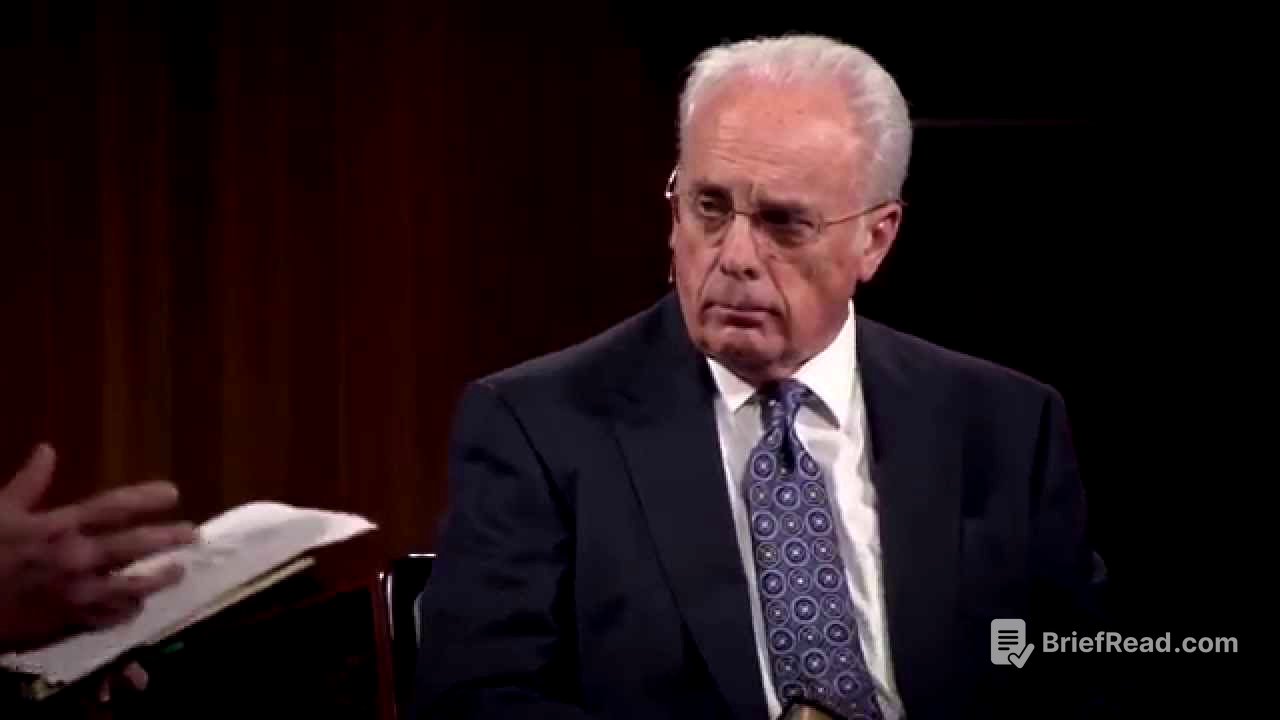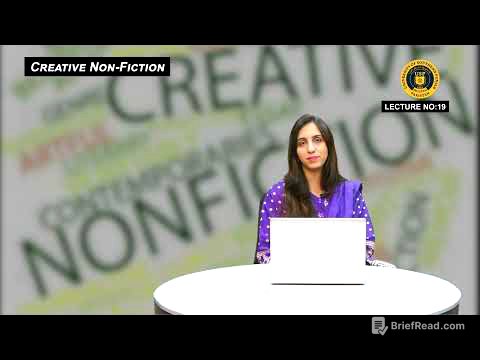TLDR;
In this conversation, John MacArthur and Phil Johnson discuss a range of theological and ministry-related topics. They reflect on MacArthur's 42-year journey of preaching through the New Testament, his views on the Charismatic Movement, the importance of biblical theology, and the challenges facing the evangelical church today. MacArthur emphasizes the need to uphold the authority of Scripture and to defend all its truths, while also cautioning against becoming overly focused on secondary issues.
- MacArthur reflects on his 42-year journey of preaching through the New Testament.
- He expresses strong concerns about the Charismatic Movement and its impact on the church.
- The discussion covers the importance of biblical theology and interpreting Scripture correctly.
- MacArthur emphasizes the need to defend all truths in the Bible and avoid drifting on key issues.
Intro and Personal Reflections [0:00]
Phil Johnson expresses his gratitude for the opportunity to interview John MacArthur, recalling how he listened to MacArthur's tapes in his twenties and admired his ministry. MacArthur humorously recounts an early encounter with Johnson involving a cold hotel room and a stranded trip to India. They both acknowledge the long-standing relationship and mutual respect they share.
Preaching Through the New Testament [2:13]
Johnson commends MacArthur on his achievement of preaching verse by verse through the entire New Testament over 42 years, a feat he believes is unparalleled. MacArthur explains how writing commentaries alongside his preaching influenced the depth and breadth of his sermons. He shares his plan to finish preaching through Mark in the summer and expresses the challenge of revisiting familiar texts from Luke while seeking fresh insights.
Future Plans and Objectives [5:36]
MacArthur reveals that he doesn't have a specific plan for what he will preach after finishing Mark, but he intends to seek the Lord's guidance. He reflects on his initial goal when coming to Grace Community Church in 1969 to preach through the entire New Testament, driven more by the desire to know the scriptures than to preach them. He emphasizes the importance of staying in one place to avoid the temptation of reusing old sermons and to maintain the relentless study required for producing commentaries.
The Charismatic Movement [10:11]
MacArthur asserts that his stance on the Charismatic Movement has not softened, viewing it as a primary reason for the church's current state. He attributes bad theology, superficial worship, ego, prosperity gospel, and personality elevation to the movement. He recalls how the Charismatic Movement, originating in Van Nuys, California, broke out of its Pentecostal containment and invaded mainline churches, demanding acceptance and corrupting theology and worship.
Cessationism and Biblical Proof [17:26]
The discussion shifts to Cessationism, the belief that Apostolic gifts and offices have ceased. MacArthur references 1 Corinthians 13 as proof that tongues will cease and points to 2 Corinthians 12:12, stating that the gifts were Apostolic signs. He argues that these gifts were meant to authenticate the true Apostles preaching the true gospel before the written text of Scripture was available. He questions why, if these gifts still existed, they would be given to those with bad theology.
Biblical Theology and Proof-Texting [20:22]
MacArthur and Johnson discuss what makes theology biblical, clarifying that it is not solely based on proof-texting. MacArthur explains that biblical theology is the truth revealed in Scripture, often understood through the composite of all that the Scripture teaches. He affirms the view that the whole counsel of God is either expressly set forth or may be deduced by good and necessary consequence from Scripture.
Consistency and Doctrinal Testing [23:52]
MacArthur emphasizes the importance of testing every doctrine through every passage of Scripture to ensure consistency. He highlights that after 42 years, their theology has stood the test of careful exposition of every single passage. He references the Bereans, who studied the scriptures to see if the things they were taught were so, looking for the collective revelation that comes through the Scripture.
Refining Theology Over Time [26:52]
MacArthur admits that occasionally, preaching through different books of the Bible over time causes him to reexamine and refine his interpretations. He credits his seminary education for providing a well-thought-out historic theological system that has anchored his teaching through the years. He contrasts this with the idea of developing one's own theology, which he finds alarming.
Doctrinal Weight and Sanctification [29:46]
MacArthur clarifies that his core doctrines have not changed dramatically over the years, but they have become clearer and carry more weight as he has studied more passages. He notes that the sanctifying process elevates one's affection for the truth, influencing how it is preached. He and Johnson discuss the importance of emphasizing key doctrines to address problems in the evangelical world.
Defending the Gospel [32:29]
MacArthur reflects on the challenges of keeping up with trends in entrepreneurial Christianity and historical isolationism. Johnson points out that MacArthur's key books are all defenses of the gospel. MacArthur discusses his book "Slave" and the profound impact it has had, particularly within the African-American community in Charleston, South Carolina, where it is being embraced as a message of freedom and elevation through slavery to Christ.
Future Books and Projects [39:58]
MacArthur shares his plans to reissue his worship book and possibly do a Sunday night series on worship. He mentions the upcoming release of Luke, volume 2, in his commentary series. Johnson highlights the project of compiling MacArthur's pulpit prayers into a devotional book, a gift from his children to the church.
BioLogos and the Authority of Scripture [42:07]
MacArthur addresses the organization BioLogos, which seeks to reconcile evolutionary doctrines with the book of Genesis. He expresses strong doubts about the Christian authenticity of those who embrace the BioLogos view, seeing it as an attack on the authority of Scripture. He recounts how Bruce Waltke's endorsement gave traction to the movement, leading evangelicals to compromise on creationism.
Fundamental Issues and Drifting Convictions [47:58]
MacArthur and Johnson discuss how evangelical convictions are drifting on issues like homosexuality and the ordination of women due to secular opinion. MacArthur asserts that the key is to get two things right: the Bible is the Word of God, and it is to be interpreted correctly. He argues that denying clear teachings of Scripture on these issues is a denial of the truth.
Together for the Gospel and Scriptural Clarity [49:13]
MacArthur states that being "Together for the Gospel" is not enough if individuals deny clear teachings of Scripture. While he is willing to fellowship with those who have different views on eschatology or baptism, he draws the line at those who set aside Scripture. He emphasizes his responsibility as an elder to provide clear signals to the flock about what is acceptable and what is not, avoiding mixed messages.
Avoiding the Pitfalls of Fundamentalism [52:09]
MacArthur cautions against focusing too much on secondary issues, as the fundamentalist movement did in the twentieth century. He reiterates that his guiding principle is what the Bible says and the clear interpretation of what it says. He believes that people drift because those with influence are too restrictive in what they will fight for, and he advocates for standing for all the truths revealed in Scripture.









